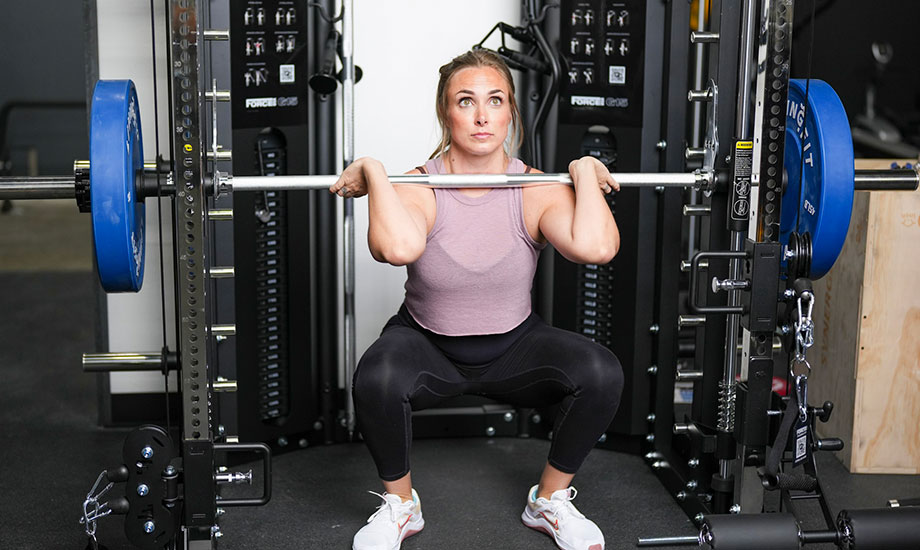We test and review fitness products based on an independent, multi-point methodology. If you use our links to purchase something, we may earn a commission. Read our disclosures.
Some fitness enthusiasts turn their noses up at the sight of a Smith machine, finding it vastly inferior to the standard mix of barbell, dumbbell, and kettlebell exercises that most strength training programs heavily incorporate.
RELATED: Types of Strength Training
Dismissing the Smith machine completely, however, is an oversight, as this handy piece of equipment offers an upside you just can’t get from free weights alone. Thanks to its approachability and design, it’s a beginner-friendly way of getting acquainted with weightlifting before biting off more than you could chew.
Kate Meier, certified personal trainer (CPT) and GGR Head of Content, discusses the benefits of the Smith machine and shares some of her favorite Smith machine exercises that can help you reach your fitness goals.
Check out our list of Smith machine workouts below!
RELATED: Best Home Gyms In 2023
What is the Smith Machine?
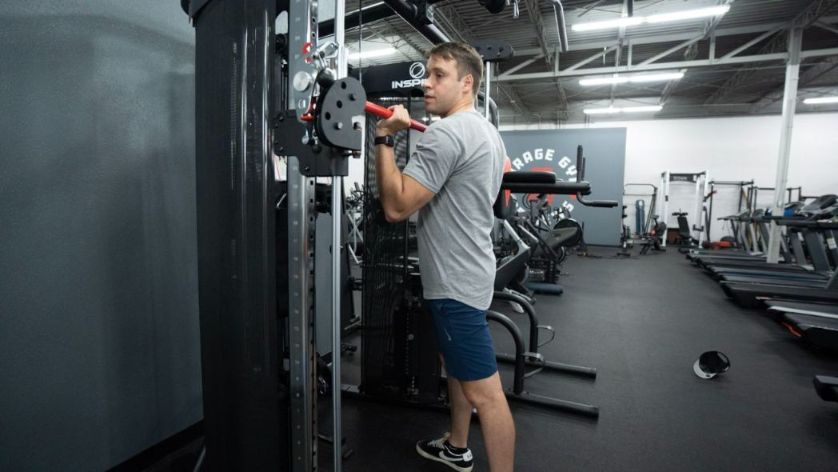
The Smith machine is a fairly ubiquitous piece of fitness equipment that features a barbell within two vertical or nearly vertical rails. Because the barbell is contained, you’re guaranteed a fixed bar path throughout the full range of motion of any exercise you perform using a Smith machine.
Additionally, there are notches along each steel rail, similar to the notches on a squat rack or power rack, that allow you to set the starting height of the barbell as well as the safety pegs that will catch the bar in the event you fail and bail the lift.
RELATED: Gym Equipment Names
Smith Machine Vs. Free Weights
Both Smith machines and free weights are commonly found in commercial gyms across the country, but what is the difference? Is one better than the other, and if so, in what ways?
“You can get in a great workout using a Smith machine,” says Kate Meier, CPT, USAW-L1, CF-L1, “but free weights offer many advantages that you can’t get from a Smith machine.”
Because of the popularity of Smith machines, many studies have examined their efficacy compared to free weights over the years, and the results generally favor free weights.
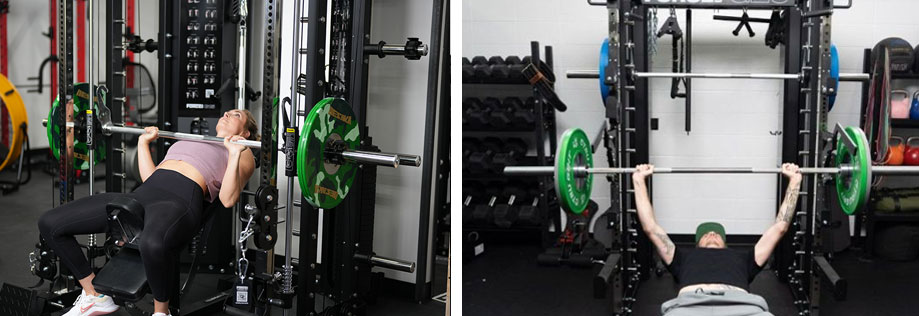
One study, published in the Journal of Strength and Conditioning Research1, found free weights superior in regards to lower body muscle activation during the squat exercise, stating “the free weight squat may be more beneficial than the Smith machine squat for individuals who are looking to strengthen plantar flexors, knee flexors, and knee extensors.”
Another study2 made a similar observation regarding the bench press, observing greater muscle activation using free weights rather than the Smith machine and ultimately determining that “strength coaches should consider choosing the free weight bench press over the Smith machine bench press because of its potential for greater upper-body muscular development.”
RELATED: Smith Machine Vs. Free Weights
Benefits of Using a Smith Machine
According to a 2020 study in the Journal of Strength and Conditioning Research3, “training with free weights or machines resulted in similar increases in muscle mass and strength,” so using the Smith machine definitely has its merits and results potential. The Smith machine can also be safer than free weights, making it great for beginners.
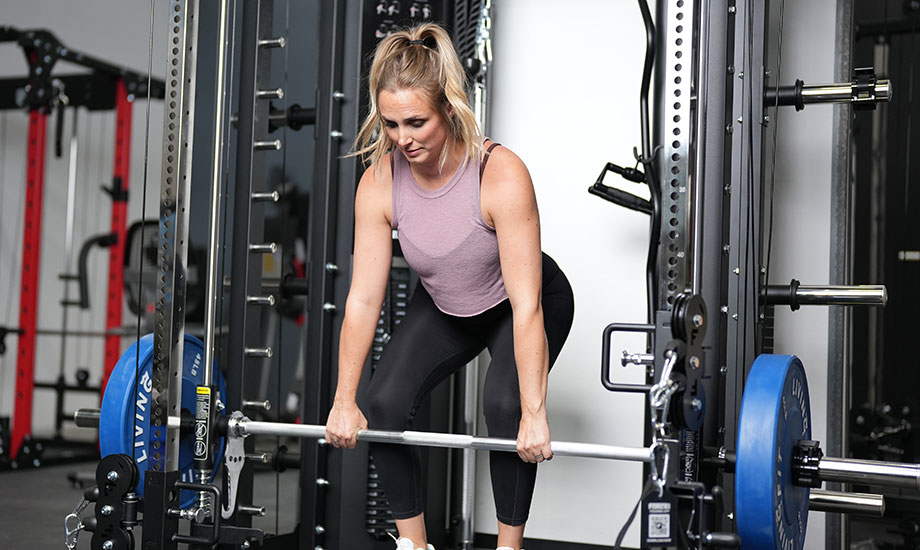
“The Smith machine forces you to maintain a straight bar path, helping beginners dial down their form on fundamental lifts before graduating to a regular power rack and barbell combo,” says Kate. “Plus, the Smith machine includes safety pegs to catch the bar in the event something goes wrong, so you’ll be fine to lift even if you don’t have a spotter present.”
Smith machines, like other selectorized machines, allow you to isolate specific muscle groups with greater ease versus free weights. Whereas you’ll need stabilizing muscles to maintain a straight bar path during lifts using regular free weights, the Smith machine stabilizes the bar for you, letting you really focus on the target muscle groups.
RELATED: Isolation Exercises
Best Smith Machine Exercises
So, what kinds of exercises can you do using a Smith machine? Here are our top picks!
Smith Machine Back Squat
Why we love it: The back squat is the undisputed champ of lower body exercises, providing activation in your glutes, quads, and hamstrings.
How to do it:
- Set your Smith machine to shoulder height, then load your desired weight.
- Get under the bar and unrack it onto your upper back and shoulders.
- Bring your hips back and bend your knees, lowering your butt towards the floor.
- Continue descending until your thighs are nearly parallel with the floor.
- Hold the position, then push from your heels and return to standing.
RELATED: What Muscles Do Squats Work?
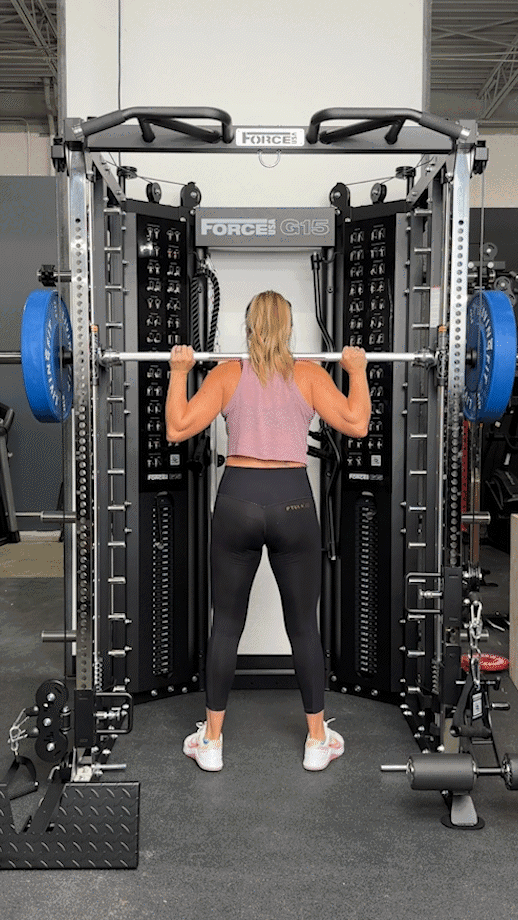
Smith Machine Front Squat
Why we love it: “Front squats increase the muscle activation in your quadriceps and core muscles,” says Kate Meier, CPT, USAW-L1, CF-L1. “Both the front squat and back squat are useful exercises for your leg workout routine, so I recommend using both exercises rotationally.”
RELATED: Lower-Body Workouts
How to do it:
- Set your Smith machine to shoulder height, load the bar, and unrack it in the front rack position across your upper chest and shoulders.
- Bring your hips back, brace your core, and slowly bend your knees to descend.
- Continue until your thighs are nearly parallel with the floor.
- Hold briefly, then drive from your heels and stand.
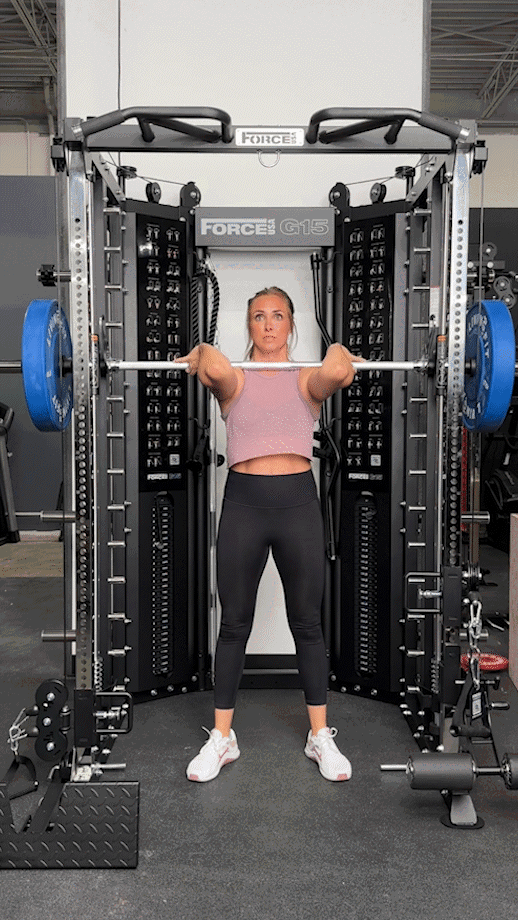
Smith Machine Incline Bench Press
Why we love it: According to the International Journal of Environmental Research and Public Health4, performing the bench press exercise at a greater inclination produces more activation in the upper pectoralis major and anterior deltoids.
How to do it:
- Place an adjustable weight bench between the rails of the Smith machine and adjust the incline to between 30 and 45 degrees.
- Set your Smith machine so you can unrack it with your arms fully extended from a seated position. Set your safeties to just below the exercise’s range of motion.
- Sit down, unrack the bar, and slowly lower it until it lightly touches your chest.
- Push the bar back to the starting position, squeezing your pecs at the top.
RELATED: Best Weight Bench
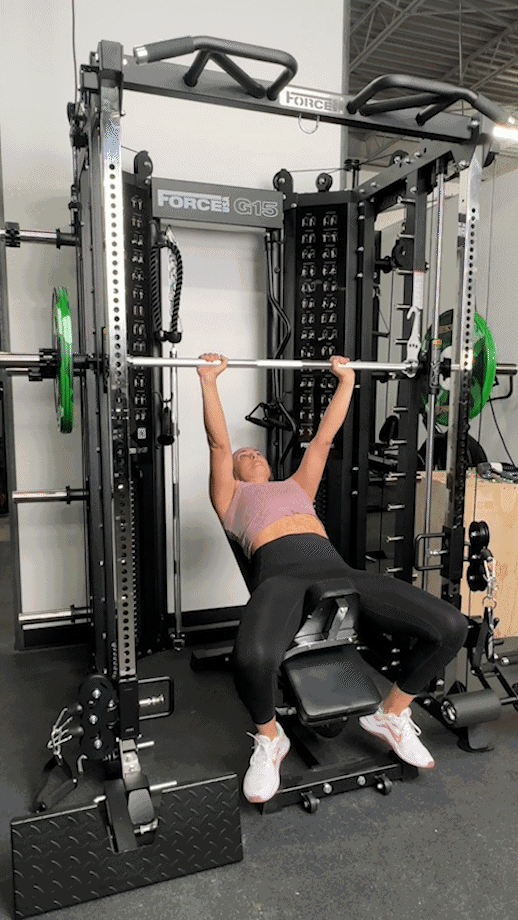
Smith Machine Seated Shoulder Press
Why we love it: “The overhead press is a great exercise for targeting your delts, traps, and triceps,” says Kate. “Performing it seated allows you to really isolate the target muscles, while using a Smith machine guarantees a perfect bar path on each rep.”
How to do it:
- Place a weight bench between the Smith machine’s rails and set the bar’s starting position to your seated shoulder height.
- Unrack the bar onto your upper chest and shoulders.
- Maintain a neutral neck position and push the bar straight up overhead.
- Squeeze your deltoids and trapezius muscles at the top, then slowly lower the bar back down.
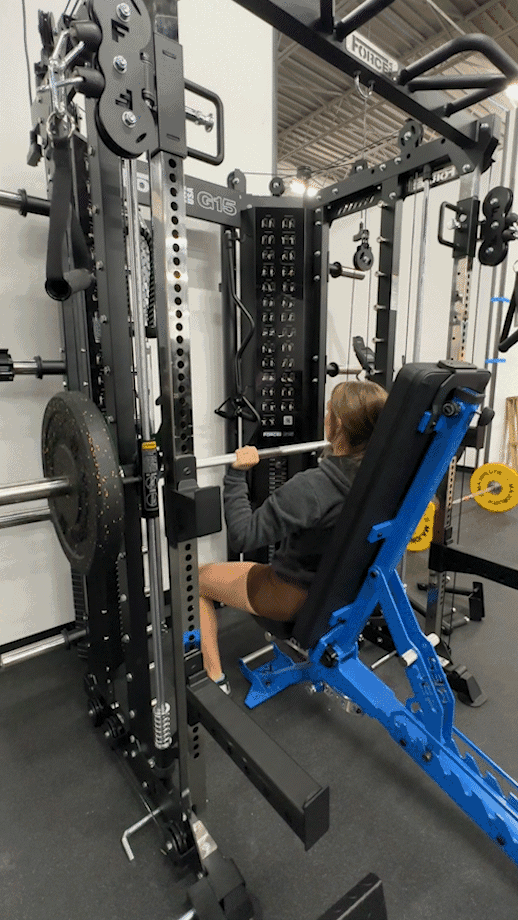
Inverted Row
Why we love it: Think of the inverted row as a bodyweight substitute for the bent-over row. According to a 2015 study in the Journal of Electromyography and Kinesiology5, “the inverted row exercise was effective for activating the medial latissimus dorsi.”
How to do it:
- Set the Smith machine to approximately hip height, then get on the floor beneath the bar.
- Grab hold with your hands shoulder-width apart using an overhand grip.
- Pull your body toward the bar, squeezing your lats at the top.
- Slowly lower yourself back to the floor.
RELATED: Bodyweight Back Exercises
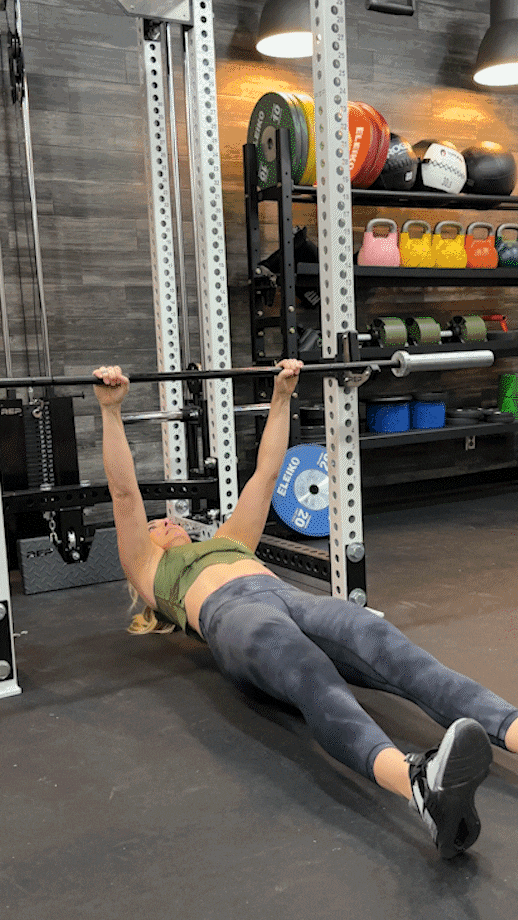
Smith Machine Romanian Deadlift
Why we love it: According to a 2020 study in PLoS One6, the Romanian deadlift provides superior hamstring activation compared to the conventional deadlift. So an RDL workout may be just the thing to get your hammies firing.
How to do it:
- Set the Smith machine to hip height and load the bar.
- Stand behind the bar with your feet hip-width apart.
- Lower the bar towards the floor by bringing your hips back and chest forward.
- Continue until you feel a stretch in your hamstrings.
- Slowly bring the bar back to the starting position.
RELATED: RDL Workout
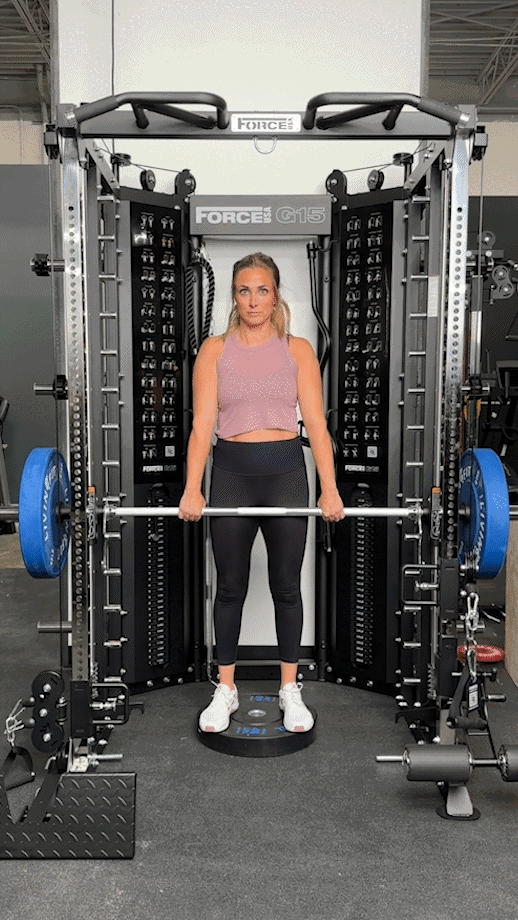
Smith Machine Reverse Lunge
Why we love it: “You can’t break the bar out of its fixed path, so forward and walking lunges don’t work for the Smith machine,” says Kate. “Reverse lunges, on the other hand, totally work!”
How to do it:
- Set the Smith machine to shoulder height, load the bar, and unrack it onto your shoulders and upper back.
- Step back with your right leg, bending both knees until they form 90 degree angles.
- Push through your left heel and bring your right foot back to center.
- Repeat the movement, this time stepping back with your left leg.
- Continue alternating reps until the set is complete.
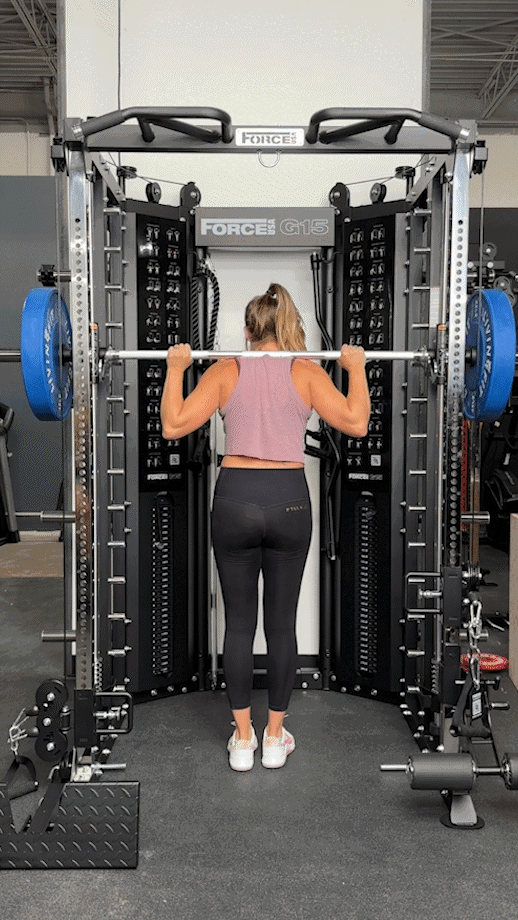
Smith Machine Behind-the-Back Shrug
Why we love it: Behind-the-back, or reverse, shrugs target your middle traps more effectively than regular front shrugs. Using a Smith machine for these is also very convenient, as the fixed barbell lets you get farther from the bar and get that rump out of the way.
How to do it:
- Set the Smith machine to approximately hip height.
- Stand with the barbell behind you, holding it with an overhand grip.
- Keeping a firm grip on the bar, raise your shoulders to your ears.
- Squeeze your traps, then slowly lower the bar back down.
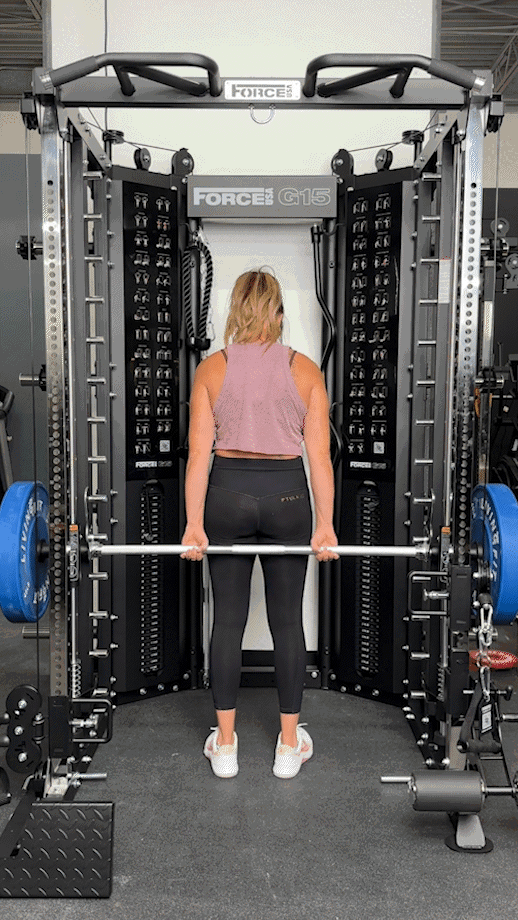
Smith Machine Calf Raise
Why we love it: The standing calf raise is one of the few calf exercises that lets you target the often-overlooked gastrocnemius muscles, helping you build muscle and strength in your calves.
How to do it:
- Set a Smith machine to shoulder height and load the bar.
- Unrack the bar onto your shoulders and upper back.
- Push yourself up onto your tiptoes and hold.
- Slowly return to the starting position.
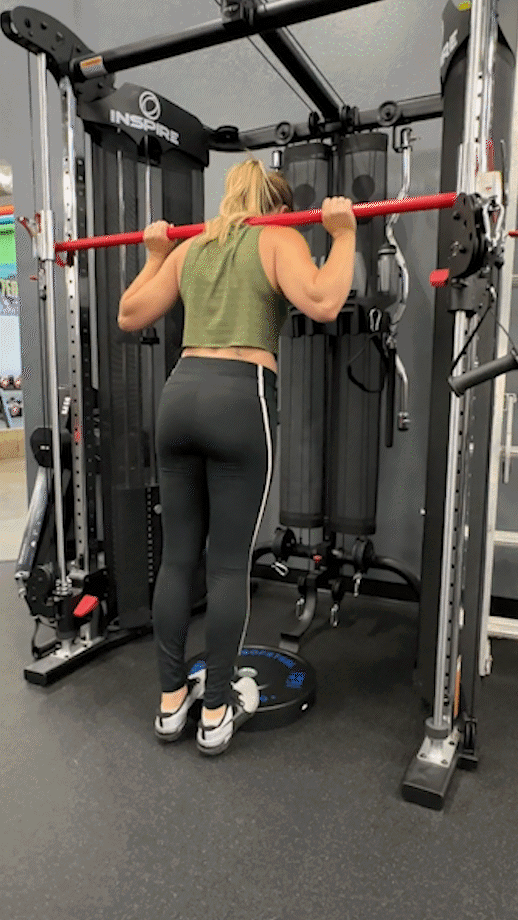
Smith Machine Hip Thrust
Why we love it: According to a 2019 review in the Journal of Sports Science & Medicine7, the hip thrust workout provides superior activation to the hip extensor muscles while also targeting the glutes, hamstrings, quads, and lower back.
How to do it:
- Set the Smith machine to a low position, load the bar, then place a weight bench parallel to the machine. You’ll want to start with your feet planted, knees bent, bar resting in your hip crease, and your upper back and shoulders pushed into the bench.
- Drive both feet into the floor and thrust your hips upward.
- Squeeze your glutes, then slowly return to the starting position.
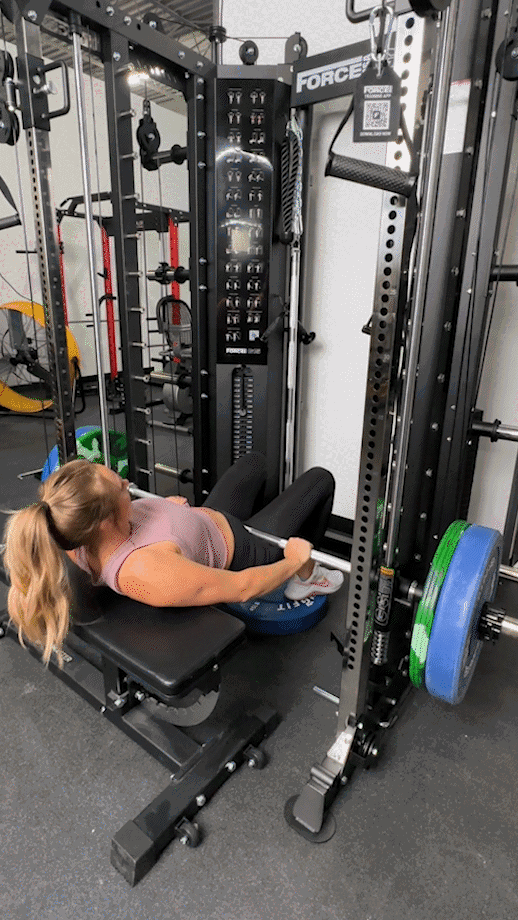
Sample Smith Machine Workout
There are many ways to incorporate a Smith machine into your workout routine. You could sprinkle Smith machine exercises into your regular split, adding the Smith machine reverse lunge into your leg day workout, for example, to supplement your standard barbell back squat and other leg exercises.
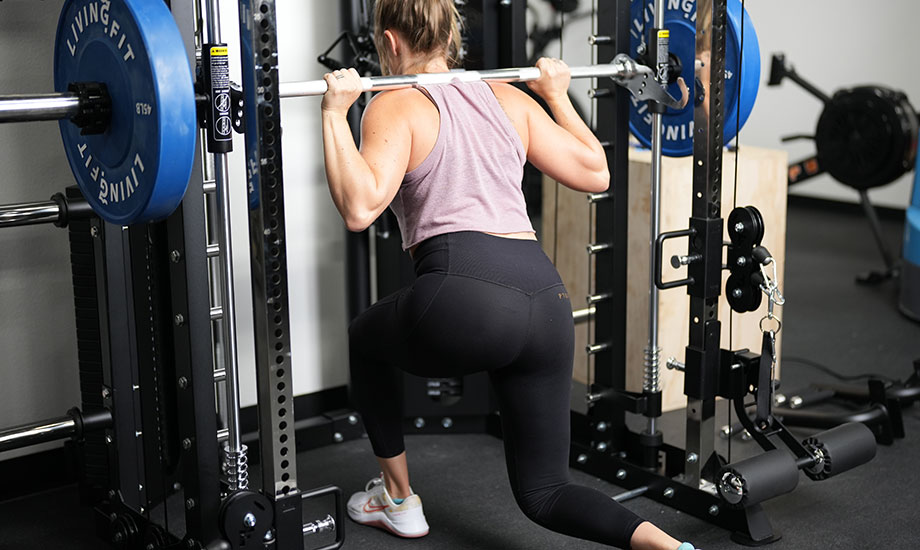
We’ve put together a full-body workout at home or the gym using only a Smith machine, so if you’re trying to get a great workout that hits every major muscle group, all you need is a Smith machine.
| Exercise | Sets | Reps |
| Smith Machine Back Squat | 3 to 6 | 8 to 12 |
| Smith Machine Incline Bench Press | 3 to 6 | 8 to 12 |
| Smith Machine Romanian Deadlift | 3 to 6 | 8 to 12 |
| Smith Machine Seated Shoulder Press | 3 to 6 | 8 to 12 |
| Smith Machine Hip Thrust | 3 to 6 | 8 to 12 |
“Our Smith machine workout uses a rep scheme conducive for hypertrophy and muscular endurance, but you can use heavier weights and reduce the number of reps if you’re looking to build strength instead,” says Kate Meier, CPT, USAW-L1, CF-L1, and GGR Head of Content.
RELATED: How Many Reps to Build Muscle
Smith Machine Workouts: Final Thoughts
The Smith machine may not be the preferred strength training modality of all athletes and coaches; however, this exercise equipment can offer incredible value for beginners learning proper form and anyone looking to switch things up in their training routine.
Smith machines are:
- Effective for strength training
- Safer than free weights
- Beginner-friendly
- Great for isolation exercises
So, if you’re ready to take your training to the next level by working Smith machine exercises into your regimen, try our trainer-recommended Smith machine workout during your next session!
Smith Machine Workouts: FAQs
Can you get a good workout on a Smith machine?
Absolutely. While some fitness enthusiasts find Smith machines inferior to free weights, the Smith machine still offers excellent exercise diversity and muscle activation, making it a viable resistance training modality.
RELATED: What is Resistance Training?
What exercises are better on the Smith machine?
Many exercises seem made for the Smith machine, as the fixed path allows you to use heavier weights without having to recruit stabilizing muscles to keep the bar under control.
The reverse shrug is an especially good Smith machine exercise because you can get further from the bar, ensuring a clean, unimpeded range of motion.
How much does the Smith machine bar weigh?
Most standard barbells weigh approximately 45 pounds, but the Smith machine bar rarely weighs as much. Often, the Smith machine bar will typically be in the 15 to 25 pound range.
Can you get a big chest with a Smith machine?
You’ll debatably get results faster by using free weights when it comes to chest development, but performing chest exercises like the bench press, incline bench press, and decline bench press using a Smith machine can still hit all the right muscle groups to encourage hypertrophy.
“Don’t rely on weight training alone,” says Kate Meier, CPT, USAW-L1, CF-L1. “Combine your workout routine with a protein-packed diet and plenty of rest, and you will be well on your way to building a big, strong chest using a Smith machine!”
RELATED: Best Protein Powder for Muscle Gain
References
1. Schwanbeck S, Chilibeck PD, Binsted G. A comparison of free weight squat to Smith machine squat using electromyography. J Strength Cond Res. 2009;23(9):2588-2591. doi:10.1519/JSC.0b013e3181b1b181
2. Schick EE, Coburn JW, Brown LE, et al. A comparison of muscle activation between a Smith machine and free weight bench press [published correction appears in J Strength Cond Res. 2011 Jan;25(1):286]. J Strength Cond Res. 2010;24(3):779-784. doi:10.1519/JSC.0b013e3181cc2237
3. Schwanbeck SR, Cornish SM, Barss T, Chilibeck PD. Effects of Training With Free Weights Versus Machines on Muscle Mass, Strength, Free Testosterone, and Free Cortisol Levels. J Strength Cond Res. 2020;34(7):1851-1859. doi:10.1519/JSC.0000000000003349
4. Rodríguez-Ridao D, Antequera-Vique JA, Martín-Fuentes I, Muyor JM. Effect of Five Bench Inclinations on the Electromyographic Activity of the Pectoralis Major, Anterior Deltoid, and Triceps Brachii during the Bench Press Exercise. Int J Environ Res Public Health. 2020;17(19):7339. Published 2020 Oct 8. doi:10.3390/ijerph17197339
5. Park SY, Yoo WG, An DH, Oh JS, Lee JH, Choi BR. Comparison of isometric exercises for activating latissimus dorsi against the upper body weight. J Electromyogr Kinesiol. 2015;25(1):47-52. doi:10.1016/j.jelekin.2014.09.001
6. Martín-Fuentes I, Oliva-Lozano JM, Muyor JM. Electromyographic activity in deadlift exercise and its variants. A systematic review. PLoS One. 2020;15(2):e0229507. Published 2020 Feb 27. doi:10.1371/journal.pone.0229507
7. Neto WK, Vieira TL, Gama EF. Barbell Hip Thrust, Muscular Activation and Performance: A Systematic Review. J Sports Sci Med. 2019;18(2):198-206. Published 2019 Jun 1.
Further reading

Build muscle, enhance your cardiovascular fitness, and develop mental toughness with these three dynamic rucking workouts put together by a CPT. Read more

Get the heart-healthy benefits of a cardio machine without spending a ton of money. Check out our list of the best treadmills under $600. Read more

We researched and tested the best ankle weights so you can start training your legs today. Read more

Our fitness experts explain the heart rate zones and how to maximize your training sessions using them. Read more

